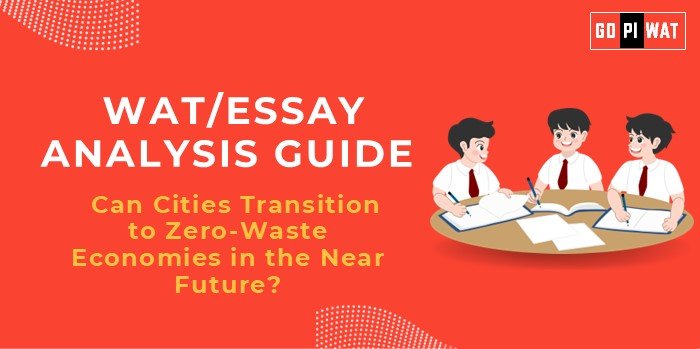📝 Written Ability Test (WAT)/Essay Analysis Guide
Can Cities Transition to Zero-Waste Economies in the Near Future?
🌟 Understanding the Topic’s Importance
This essay evaluates the feasibility of zero-waste economies in urban areas, addressing sustainability and economic resilience. It aligns with themes like environmental economics, urban planning, and sustainable development.
🕒 Effective Planning and Writing
- Time Allocation:
- Planning: 5 minutes
- Writing: 20 minutes
- Review: 5 minutes
- Word Count Distribution:
- Introduction: 60 words
- Body: 350 words
- Conclusion: 90 words
💡 Introduction Techniques for Essays
- Contrast Approach: “While cities generate 70% of global waste, initiatives like Kamikatsu’s zero-waste model prove that sustainable urbanization is possible.”
- Solution-Based Approach: “Achieving zero-waste economies in cities requires an integrated approach combining policies, technology, and community participation.”
📚 Structuring the Essay Body
Achievements:
- San Francisco’s 80% waste diversion rate.
- Kerala’s decentralized waste management model.
Challenges:
- Urban-rural disparity in waste infrastructure.
- Economic barriers for developing cities.
Future Outlook:
- Adoption of waste-to-energy plants.
- Increased global collaboration for sustainability goals.
✅ Concluding Effectively
- Balanced Perspective: “While zero-waste economies face challenges, the growing global commitment to sustainability and the success of pioneering cities offer a roadmap for transformation.”
- Global Comparison: “Learning from global leaders like Sweden and Singapore, cities worldwide can create scalable and adaptable zero-waste models.”
🔍 Analyzing Successes and Shortcomings
Achievements:
- Circular economy potential for $4.5 trillion economic benefits.
- Proven success stories in developed cities.
Challenges:
- Infrastructure gaps in low-income regions.
- High upfront costs.
Global Context:
- Contrast between Sweden’s energy recovery model and Africa’s unmanaged waste crises.
🔑 Recommendations for Sustainable Progress
- Invest in smart waste management technologies.
- Promote public awareness campaigns.
- Create incentives for corporates adopting sustainable practices.
📝 Sample Short Essays
1. Balanced Perspective
Urban waste is a growing concern, but with policies like extended producer responsibility and community-driven solutions, cities can steadily progress toward zero-waste economies.
2. Solution-Oriented
Zero-waste cities are possible through investments in infrastructure, public-private partnerships, and citizen engagement programs.
3. Global Comparison
By adopting the waste-to-energy strategies of Sweden and the digital waste tracking systems of Singapore, cities globally can transition to zero-waste economies.


